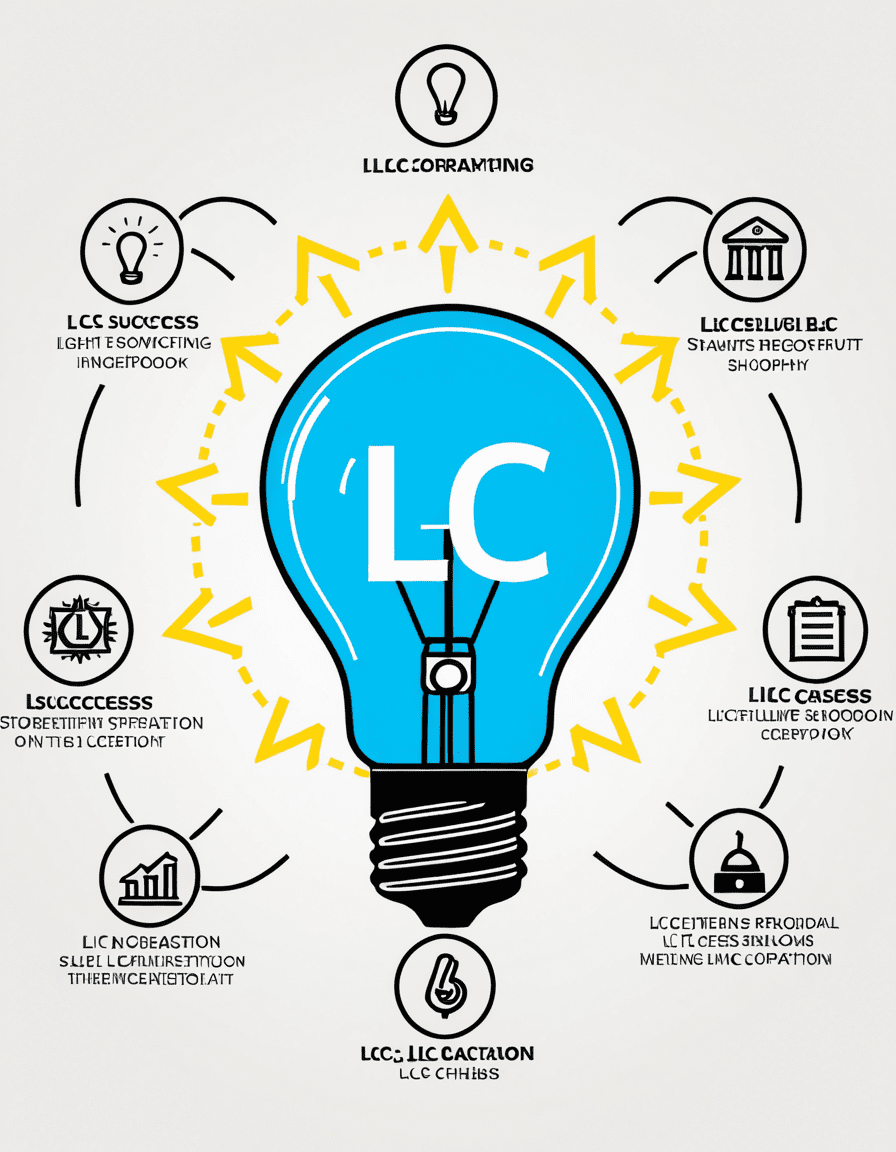Establishing a business can be both exciting and daunting. One key decision you’ll face is understanding what is a LLC (Limited Liability Company). This business structure combines the best of both worlds by offering you personal asset protection while also allowing for flexible tax options. If you’re an entrepreneur looking to safeguard your personal wealth and streamline your operations, understanding LLCs might just be your golden ticket.

What Is A LLC: Understanding the Basics
A Limited Liability Company (LLC) stands out from other business structures like corporations and partnerships. What sets an LLC apart is its ability to shield personal assets from business liabilities. Imagine starting a coffee shop; if your business racks up debts or gets sued, your personal property—like your home and savings—remains protected. That’s limited liability in action, and it’s why so many business owners choose this structure.
Just like a robust structure needs a solid foundation, your LLC provides the necessary framework to operate effectively. LLCs are established under state law, making it crucial for aspiring business owners to understand the specifics in their state. The members of an LLC can include individuals, corporations, or even other LLCs, giving you flexibility when forming your business. In short, this model helps you focus on growing your business instead of worrying about personal financial risk.
LLCs are increasingly popular among entrepreneurs for their simplicity. Setting one up is straightforward compared to a corporation, which requires more paperwork and regulations. This ease of use is a significant reason why many startups, from tech firms to local cafés, choose the LLC route. So, if you’re thinking about starting a business, ask yourself: “Does an LLC make sense for me?” It very well might!

Top 5 Reasons Why An LLC Is Essential For Your Business
Like a knight’s armor, an LLC provides protection against personal liability. If your business encounters legal issues or defaults on a loan, your personal assets are usually safe. Let’s say your hair salon faces a lawsuit over a hair treatment gone wrong. An LLC would mean your savings and home are generally off-limits in that case.
One of the standout features of LLCs is their flexible tax treatment. LLCs can opt for pass-through taxation, meaning profits are taxed only at the personal level. For example, if your teaching business profits $100,000, you’d only pay taxes on that income as an individual, rather than twice at the company and personal levels. This flexibility can make a substantial difference in your tax bill!
An LLC can boost your business’s credibility in the eyes of customers and partners. When potential clients see that you’re a legally recognized business entity, they often feel more confident doing business with you. Establishing a formal structure signals professionalism, leading to enhanced trust and loyalty over time. It’s a simple way to convey that you take your business seriously.
Compared to corporations, LLCs offer fewer formalities. This simplicity allows small business owners to focus on their core operations instead of drowning in paperwork. For instance, many creative startups utilize LLCs for this reason, so they can spend their time developing products instead of filling out endless forms. This straightforward approach helps streamline your business processes.
Investors often prefer funding an LLC because they understand the limited risk involved. The chance to invest in a business with structured profits and liability protection can be enticing for many. Many growing companies begin their journey as LLCs before evolving into larger corporate structures, showcasing the potential of this business model to scale.
What Is A Union and Why Entrepreneurs Should Care
Understanding other business structures, such as unions, can also be beneficial for entrepreneurs. So, what is a union? It’s a collective organization formed by workers to advocate for their rights, negotiate fair wages, and improve working conditions. As a business owner, knowing how unions operate can inform your hiring practices, particularly if you staff employees.
By fostering fair labor practices, you create a more robust workplace culture. Happy employees often lead to lower turnover rates and enhanced productivity. Plus, a company that respects labor rights stands out in a crowded market, attracting talent and gaining customer loyalty. It pays to understand these dynamics, especially if your business grows in size.
Moreover, if you plan to hire staff, having a grasp of union principles can help you establish a cooperative environment. Ensuring fair treatment from the start may limit conflicts down the line. This foresight can be the difference between a thriving workplace and one filled with dissatisfaction.
What Is A Mission Statement: Aligning Business Goals with Values
A mission statement defines your company’s purpose and primary objectives. For an LLC, a thoughtful mission statement can act as a northeast star, guiding members toward common goals. What is a mission statement, then? It’s a concise declaration that articulates your organization’s mission, values, and goals.
For instance, consider Starbucks’ mission to “inspire and nurture the human spirit.” This statement informs its operational strategies and connects consumers to a larger community vision. As you develop your mission, ponder your business’s core values and what you hope to achieve in the market.
A well-crafted mission statement ensures clarity and ambition across your team. By unifying everyone under the same banner, you can create a strong, collaborative work environment. Coupled with a solid business structure like an LLC, a mission statement positions your company for long-term success.
What Is A Dividend: Sharing Business Profits
When discussing profits, you might wonder, what is a dividend? Generally, dividends are payments made by corporations to shareholders from their profits. However, it’s essential to note that LLCs typically don’t distribute dividends in the same way. Instead, profits made within an LLC can be allocated among its members.
Understanding how profits can be distributed is crucial for LLC members, particularly when deciding between reinvesting for growth or taking personal income out. For instance, if your online boutique earns $50,000 in profits, you and your partners can decide how to allocate those funds—whether to reinvest into inventory or take a distribution as personal income.
Planning these financial moves effectively can help sustain your business while also allowing you to reap rewards from your hard work. It’s critical to be aware of how those profits work to capitalize on them fully.
What Is A Bond: Funding and Financing Options
Exploring various financing avenues is vital when growing your LLC. What is a bond? A bond is a debt instrument businesses and governments use to raise capital. For LLCs eyeing expansion, issuing bonds can be an excellent way to fuel new projects.
Take Tesla, for example; the company has issued bonds multiple times to fund its expansion efforts and innovation projects. This method can be appealing, especially if your LLC is scaling and needs funds for unexpected costs or new initiatives. Understanding different funding options, including bonds, can give you the resources necessary to succeed.
As you navigate the financial waters of your LLC, exploring bonds and their potential can open new doors for investment and growth. Each funding option has its risks and benefits, so knowing your choices helps make informed decisions to propel your business forward.
The Power of Knowledge in Business Formation and Growth
Establishing an LLC can provide several advantages, from liability protection to tax flexibility, making it an ideal choice for aspiring entrepreneurs. But grasping concepts like unions, mission statements, dividends, and bonds enhances your ability to manage effectively. Equip yourself with this knowledge to strategically position your LLC for success in a competitive market.
Adopting a proactive learning approach can set you apart from those simply trying to keep their heads above water. Remember, knowledge is power; harness it as you navigate your business journey. With the right foundation in place, you’ll be well-prepared to thrive and enjoy the fruits of your labor. Whether you’re just starting out or looking to scale your operations, understanding what is a LLC and the nuances of business ownership is vital for a successful enterprise.
What Is A LLC: Fun Trivia and Interesting Facts
When diving into the question of what is a LLC, it’s important to consider why so many entrepreneurs choose this structure over others. LLC stands for Limited Liability Company, and one of its key features is how it protects personal assets. Imagine you’re Barbara Rush; if something goes wrong with your business, your personal belongings remain safe from creditors. That’s quite a relief, especially in an unpredictable market!
The Perks of LLCs and Their Impact
Another fascinating point about what is a LLC is that it offers flexibility in management. Unlike corporations, LLCs can be managed by members or designated managers, making it adaptable to various business needs. For instance, think about running a small business like the Bank Of Stockton; they can choose how to best operate while enjoying liability protection. Additionally, these companies usually face fewer reporting requirements than their corporate counterparts, which can save time and money.
Additionally, LLCs often provide tax benefits. Owners, known as members, can elect for pass-through taxation, avoiding the double taxation faced by some corporations. This certainly puts a smile on the faces of those managing finances, to say the least! Speaking of managing funds, have you ever wondered What Is a CD? That’s a Certificate of Deposit, another financial tool worth knowing about, especially for business owners looking to streamline cash flow.
The LLC in Pop Culture
LLCs aren’t just the backbone of serious business. You might be surprised to learn that even in the world of entertainment, LLCs play a crucial role. Famous influencers and brands utilize them to protect their interests. It’s sort of like how creators, such as those revealing their identities—like in the recent Dream face reveal—sometimes operate under entities that provide protection and credibility. Just think how Laverne might have navigated her success if she’d set up an LLC; it could’ve saved her from a bunch of headaches and liabilities!
In pop culture, remember actors like Valentina Zenere? They often establish businesses or charities through LLCs, ensuring their creations remain financially sound and secure. And while we’re on the subject of security, it’s interesting to see how both individuals and businesses are increasingly leaning towards financial products like Aag reverse mortgage Reviews might showcase for those who need to tap into home equity.
Understanding what is a LLC can provide a solid foundation for making informed decisions. Whether you’re in a bustling small town like Breezy Point or eyeing success from a larger scale, remember that starting with an LLC could lead you to more opportunities while keeping your personal assets intact!



